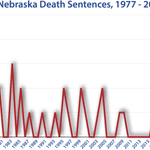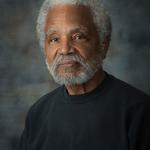
State & Federal
Nebraska

History of the Death Penalty
Nebraska had a referendum on the ballot in November 2016 to determine whether to retain or suspend the legislature’s repeal of capital punishment. The referendum passed, 61% — 39%. For more information, see Ballotpedia, Nebraska Death Penalty Repeal, Referendum 426 (2016).
Timeline
1863 — The first recorded execution carried out in Nebraska. Cyrus Tator is hanged for murder.
1973 — Nebraska reinstates the death penalty following Furman v. Georgia.
1979 — The Nebraska Unicameral Legislature passes a bill abolishing the death penalty, but it is vetoed by Governor Charley Throne.
1987 — William Marion is granted a posthumous pardon 100 years after his execution on the grounds that his “victim” had been seen alive in 1891.
1999 — Jerry Simpson and Clarance Victor are taken off of Nebraska’s death row because of intellectual disability. Both men had IQs less than 70, and it is unconstitutional to execute people with developmental disabilities.
1999 — The Nebraska Legislature is the first in the nation to pass a moratorium on the death penalty during a study on the fairness of its application.
2000 — The Nebraska Supreme Court vacates the death sentences of Randy Reeves after finding that the court sentenced him with improper procedures. Mr. Reeves was resentenced to two life terms.
2007 — The Nebraska Unicameral Legislature comes within one vote of passing a repeal bill.
2008 — The Nebraska Supreme Court rules the electric chair unconstitutional, creating a de facto moratorium on executions.
2009 — A bill to instate lethal injection as the state’s primary method of execution is passed and signed, ending the de facto moratorium.
2015 — Nebraska Unicameral Legislature passes a bill abolishing the death penalty.
2015 — A large shipment of lethal injection anesthetic sodium thiopental is halted in India by FedEx before it can reach Nebraska due to a lack of FDA clearance.
2016 — Nebraska voters approve a ballot question that reverses the legislature’s repeal of the death penalty and restores capital punishment.
2018 — The Nebraska Legislature issues a subpoena requiring Director Scott Frakes to testify about efforts to obtain execution drugs due to allegations that they had not complied with federal drug laws. Attorney General Doug Peterson sues the legislature to block Mr. Frakes from testifying.
2018 — Nebraska executes Carey Dean Moore, after 21 years without an execution. He is executed is a never-before-tried four-drug execution protocol of diazepam (Valium), fentanyl citrate, cisatracurium besylate, and potassium chloride.
2018 — German-based pharmaceutical company Fresenius Kabi files suit in federal court alleging that Nebraska intended to execute Carey Dean Moore using drugs obtained “through improper or illegal means.”
2020 — Nebraska Supreme Court orders the Department of Correctional Services to release public records related to the procurement of drugs used in the execution of Carey Dean Moore.
2020 — Governor Ricketts vetoes a bill that would have increased transparency in the state’s execution process by allowing witnesses to see the execution the moment the prisoners enters the death chamber until the prisoner is declared dead or the execution is halted.
2023 — Nebraska Judiciary Committee proposes constitutional amendment that would prohibit the death penalty in the Nebraska Constitution if approved by voters in the 2024 general election.
2023 — Death row prisoner Aubrey Trail waives appeals and petitions Nebraska Supreme Court for an execution date, despite unavailability of lethal injection drugs.
Famous Cases
The Beatrice Six
The 1985 case of the rape and murder of 68-year-old Helen Wilson in the town of Beatrice resulted in the arrest of six people, even though the original FBI investigation concluded that the killer had acted alone. Joseph White was convicted of the crime in 1989 and sentenced to life in prison, and the eyewitness testimony that led to White’s conviction came from the five co-defendants in the case. Of them, three received sentences of 10 years in prison in exchange for their testimony, while another was scheduled for release in 2009. The final defendant, Thomas Winslow, pleaded no contest to aiding and abetting first-degree murder and received a 50-year sentence.
In 2008, Joseph White became the first post-conviction DNA exoneration in Nebraska’s history when he won a historic legal case that overturned his 1985 murder conviction. The DNA Testing Act passed by the Nebraska Legislature in 2000 allowed White’s motion for testing, which showed the forensic evidence found at the crime scene came from one man, and that man was not Joseph White.
Five of the six people charged in this case pleaded to lesser charges, when they were in no way involved in the crime, in order to avoid the death penalty. Six innocent people feared being convicted and sentenced to death, and the only person to maintain his innocence in court was convicted and sentenced to life in prison.
Charles Starkweather
The Starkweather case was one of the most heavily publicized mass murders in U.S. history, drawing national attention both to Nebraska and to the psychological issues surrounding disaffected youth. The saga began when 19-year-old Charles Starkweather killed a gas station attendant in December 1957. Then, in late January 1958, Charlie and his 14-year-old girlfriend Caril Ann Fugate began an eight-day murder spree that started with the murder of Caril’s family, and eventually led to ten total deaths before they were captured on the highway outside Douglas, Wyoming. Tried and convicted of murder, Charles Starkweather was executed at the Nebraska State Penitentiary on June 25, 1959. Caril Fugate was also convicted, and her initial life sentence was commuted to a 30 to 50 year sentence in 1973. In 1976, after serving 18 years, Fugate was paroled and she eventually resettled in Michigan.
Notable Exonerations
William Marion was executed in Gage County in 1887. He was convicted on circumstantial evidence of murdering his business partner, John Cameron, after a man dressed in Cameron’s clothes was found dead. The trial was such a local sensation that it was moved to the Opera House to accommodate a larger audience. An editorial in the local newspaper said “it was because of the indignation among the people and the fact that Marion had no friends and no money, that he was selected to satisfy the public wrath.” His “victim” was seen alive in 1891 and a posthumous pardon was granted in 1987, 100 years after Marion was executed.
Mead Shumway was executed in 1909 for crushing the skull of a Gage County farmwoman. Three years after the execution, another man allegedly confessed on his deathbed to killing the woman. However, the only evidence we have for the confession is from an article in the 1919 issue of the Journal of the American Institute of Criminal Law and Criminology. Another twist to this case came when a member of Shumway’s jury committed suicide soon after the conviction. The Juror was reportedly despondent about going along with the rest of the jury and believed that Shumway was innocent.
In 2001, Jeremy Sheets was released after prosecutors decided not to retry his case. Sheets was sentenced to death in 1997 for the 1992 kidnapping and murder of a young woman in Omaha. The Nebraska Supreme Court overturned Sheets’ conviction because there was no evidence against him other than a taped confession by another man, Adam Barnett, who said he committed the crime with Sheets. Barnett hung himself before Sheets’ trial, so Sheets was unable to confront his accuser and thus the tape could not be used against him.
Notable Commutations, Clemencies, and Sentence Reversals
In 1999, Jerry Simpson and Clarence Victor were taken off of Nebraska’s death row because their IQs were less than 70 and it is now unconstitutional to execute people with developmental disabilities.
In 2000, the Nebraska Supreme Court vacated the death sentence of Randy Reeves because the court sentenced him with improper procedures. Reeves had been sentenced to death for the drug-induced murder of Janet Mesner and Victoria Lamm in Lincoln in 1980. Reeves was sentenced to two life terms instead.
In 2001, Peter Hochstein and Michael Anderson were taken off death row and given life in prison because their sentencing judicial panels could not reach a unanimous decision to impose the death sentence. Anderson and Hochstein were sentenced to death for the 1975 murder-for-hire of an Omaha businessman.
Milestones in Abolition/Reinstatement
In 1979, the Nebraska Unicameral Legislature passed a bill abolishing the death penalty, but the bill was vetoed by Governor Charley Thone.
In 1999, the Nebraska Legislature was the first state in the nation to pass a moratorium on carrying out the death penalty during a study on the fairness of its application. The moratorium bill was vetoed by Governor Mike Johanns. The legislature unanimously overrode the Governor’s veto of the appropriations bill that funded a study on the fairness of the death penalty in Nebraska.
In 2007, the Nebraska Unicameral came within one vote of passing a repeal bill.
In 2008 the electric chair was ruled unconstitutional by the Nebraska Supreme Court, creating a de facto moratorium. A bill to instate lethal injection as the state’s method of execution was passed in 2009.
In 2015, the Nebraska Unicameral Legislature passed a bill abolishing the death penalty. The bill was vetoed by Governor Pete Ricketts, but the 49-member legislature overrode the veto.
In 2016, Nebraska voters approved a ballot question reversing the legislature’s repeal of the death penalty and restoring capital punishment in the state.
Other Interesting Facts
In every session of the legislature since 1981, senators have introduced a bill to abolish the DP. While there have been years in which the abolition bill has advanced out of committee, and even one year in which it initially had 25 sponsors (out of 49 senators), Nebraska did not repeal its death penalty until 2015. When Nebraska repealed the death penalty in 2015, it became the first state with a predominantly Republican legislature to do so since North Dakota abolished the death penalty in 1973.

Resources

Nebraska Execution Totals Since 1976
News & Developments
News
Jun 04, 2025
2025 Roundup of Death Penalty Related Legislation
More than one hundred bills have been introduced this year in 34 states and in Congress to expand and limit use of the death penalty, abolish and reinstate the death penalty, modify execution protocols and secret the information about them, and alter aspects of capital trials. Thus far, nine bills in five states have been enacted, with Florida enacting the most legislation. Of the bills that have been signed into law, three modify execution protocols; two expand…
Read MoreNews
Feb 09, 2024
Black History Month Profile Series: Ernie Chambers
This month, DPIC celebrates Black History Month with weekly profiles of notable Black Americans whose work affected the modern death penalty era. The first in the series is retired Nebraska state senator…
Read MoreNews
Jan 12, 2024
State Legislative Roundup: New Legislation on the Death Penalty
The first month of 2024 marks the start of new legislative sessions for many states and a number of new proposals pertaining to the…
Read MoreNews
Aug 17, 2023
Death-Sentenced Prisoner Aubrey Trail Waives Appeals and Petitions Nebraska for Execution Date Despite Unavailability of Lethal Injection Drugs
On August 8, 2023, death-sentenced prisoner Aubrey Trail petitioned the state to set his execution date. Currently, there are 10 others on death row in Nebraska, but the state does not possess the necessary lethal injection drugs for any executions. Nebraska has not executed anyone in more than five years. The last person executed was Carey Dean Moore in 2018 via lethal injection. Mr. Trail confessed to the 2017 killing of Sydney Loofe and was sentenced to death by…
Read MoreNews
Nov 17, 2021
Nebraska Narrowly Avoids Sending First-Ever Woman to Death Row as 3‑Judge Panel Splits on Sentence for Bailey Boswell
Nebraska, which had no plans for housing a female death-row prisoner, has narrowly avoided having to address that failure, as a divided three-judge panel on November 8, 2021 sentenced Bailey Boswell to life in prison without…
Read More


